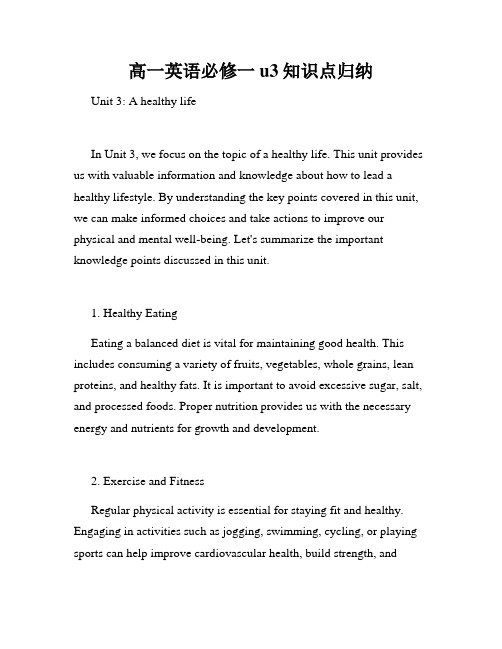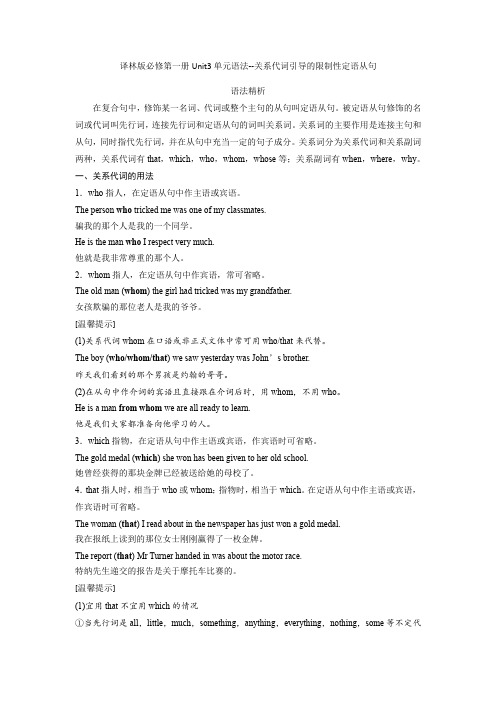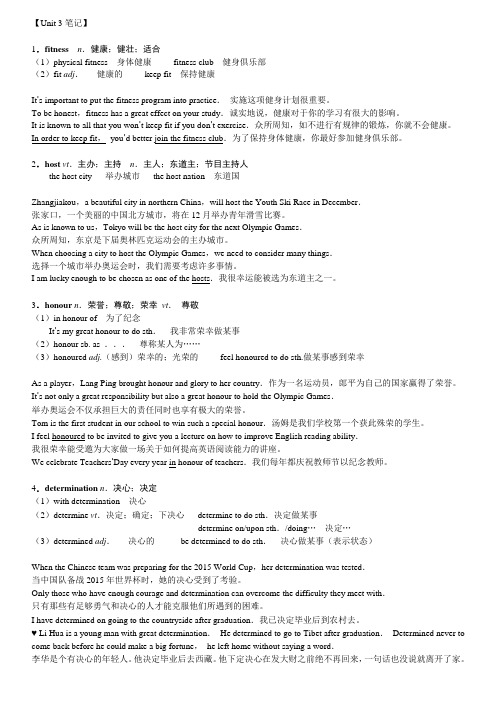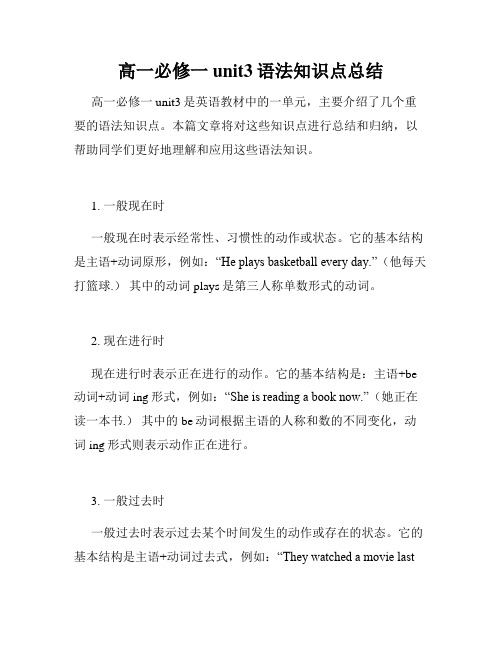高一必修一unit3语法
第06讲 必修一unit3语法讲解(原卷版)新高一英语暑假衔接课(译林版2020)3

第06讲必修一unit3语法讲解(原卷版)Unit3关系代词引导的定语从句定语从句:在一个主从复合句中修饰某一个名词、代词或修饰整个主句的从句叫定语从句。
换句话说,定语从句就是用来作定语的句子。
先行词:被定语从句修饰的名词或代词叫先行词。
关系代词:连接先行词和定语从句的词叫关系词。
若先行词在从句中作主语、宾语和定语等,应用关系代词引导定语从句。
关系代词具体有:that,which,who,whom,whose定语从句的位置:一般紧跟在先行词后面。
但有时因句子结构的需要,定语从句和先行词被某些成分隔开。
关系代词的基本用法关系代词从句中作用例句who指人作主语宾语(可省略)1.This is the girl who/that teaches us English.(who/that指人,修饰先行词the girl,在从句中作主语)2.He is the boy whom/who/that I met yesterday.(whom/who/that指人,修饰先行词the boy在从句中作宾语,whom/who/that可省略。
)whom指人作宾语(可省略)whose指人、物作定语3.This is the girl whose father is an engineer.(whose 作定语,用来修饰人)4.I live in a room whose windows face the south.(whose作定语,用来修饰物,whose windows=the windows of which或of which the windows)5.The boss in whose department Mr.King worked called at the hospital.(whose可在从句中与它所修饰的词一起作介词宾语)which指物作主语宾语(可省略)6.This is the book which/that I lost yesterday.(which/that 指物,作宾语,可省略)7.The clock is an instrument which /that can tell time.(which /that 指物,作主语)8.Do you know the woman that /who lives next door?(that /who 指人,作主语)that 指人、物作主语宾语(可省略)as指物作主语、宾语可修饰整个主句9.This is the same pen as I bought yesterday.(as 指物,在从句中作宾语)10.As we all know,Taiwan is part of China.(as 指代整个主句的内容)使用关系代词时应注意的几个问题:a.在以下几种情况下只使用that 不用which 。
人教版高一英语必修一Unit-3-语法

(2) 用在状语从句中用一般现在时代替将来时。 If you do that again, I’ll hit you.
(3) 用在I bet 和I hope后面, 常用一般现在时 表将来。 I bet you don’t get up before ten tomorrow. 我敢说你明天不到10点是不会起床的。
③ be to+动词原形:表示按计划要发生的事 或征求对方意见。 Are we to go on with this work?
④ be about to+动词原形,表示即将发生 的动作,不与表示将来的时间状语连用。
I was about to go swimming when my guide shouted at me and told me not to do so. 我正要去游泳, 这时向导大声叫我不要 去。
练一练
1. Betty i_s__le_a_v_i_n_g(leave) for Guangzhou by plane at 3:00 this afternoon. Her brother Bob i_s__s_e_e_in__g(see) her off. It’s half past one now. They _a_re__w__a_it_i_n_g(wait) for a taxi outside the school gate.
⑤ 一般现在时表示将来时 (1) 按规定预计要发生的未来动作,仅限于
动词come, go, leave, move, start, return, arrive, begin, stay等动词. The plane takes off at 10:10. That is, it’s leaving in ten minutes.
2019外研版高中英语必修一Unit3 Family matters 语法 一般现在时

Unit3 Family matters 语法一般现在时一、一般现在时观察①I often read books in my spare time.在我的空闲时间我经常读书。
②Mary is good at music.玛丽擅长音乐。
③The earth moves around the sun.地球绕着太阳转。
④You'll make great progress if you work hard!如果你努力学习/工作,你会取得很大进步!⑤The train leaves at 7: 25 this evening.火车今晚7: 25离开。
⑥Harry Potter is set in the modern world.《哈利·波特》以现代世界为背景。
⑦Pride goes before a fall.骄者必败。
归纳1.构成:动词①________或动词的②________形式。
2.基本用法:(1)一般现在时表示现在经常发生的动作或存在的状态,常和often、always、usually、sometimes、every day、seldom,never等表示的时间状语连用,如句①。
(2)一般现在时用于描述主语的特征、性格、④________等,如句②。
(3)一般现在时用于陈述客观事实或⑤________,如句③。
(4)在主从复合句中,当描述将来的事情时,条件状语从句和时间状语从句用一般现在时代替⑥________,如句④。
(5)一般现在时表示按规定、计划或时间表将要发生的动作,通常限于表示“⑦________”的非延续性动词(词组),如go、come、leave、arrive、take off等,其后常跟有表示将来的时间状语,如句⑤。
(6)小说故事、电影、文学作品等的情节介绍、评论等一般使用般现在时,如句⑥。
(7)一般现在时常用于⑧________中,如句⑦。
二、现在进行时观察①All the classmates are reviewing the lesson in the classroom now.所有同学此刻正在教室里复习功课。
高一英语必修一u3知识点归纳

高一英语必修一u3知识点归纳Unit 3: A healthy lifeIn Unit 3, we focus on the topic of a healthy life. This unit provides us with valuable information and knowledge about how to lead a healthy lifestyle. By understanding the key points covered in this unit, we can make informed choices and take actions to improve our physical and mental well-being. Let's summarize the important knowledge points discussed in this unit.1. Healthy EatingEating a balanced diet is vital for maintaining good health. This includes consuming a variety of fruits, vegetables, whole grains, lean proteins, and healthy fats. It is important to avoid excessive sugar, salt, and processed foods. Proper nutrition provides us with the necessary energy and nutrients for growth and development.2. Exercise and FitnessRegular physical activity is essential for staying fit and healthy. Engaging in activities such as jogging, swimming, cycling, or playing sports can help improve cardiovascular health, build strength, andenhance overall well-being. It is recommended to exercise for at least 30 minutes a day to maintain an active lifestyle.3. Mental HealthTaking care of our mental well-being is equally important as our physical health. Stress management techniques, such as practicing mindfulness, engaging in hobbies, and seeking support from friends and family, can help reduce anxiety and improve mental resilience. Maintaining a positive outlook on life can also contribute to a healthy mind.4. Importance of SleepAdequate sleep plays a crucial role in maintaining good health. It is recommended that teenagers get around 8-9 hours of sleep each night. Quality sleep helps in the consolidation of learning, strengthens the immune system, and aids in overall growth and development.5. Substance AbuseUnderstanding the risks associated with substance abuse is essential for leading a healthy life. It is crucial to stay away from drugs, alcohol, and tobacco, as they can have harmful effects on our physical andmental well-being. Building strong self-esteem and making informed decisions can help avoid these harmful substances.6. Hygiene and Personal CareMaintaining personal hygiene is important for preventing illnesses and promoting overall well-being. Regularly washing hands, taking showers, brushing teeth, and keeping a clean living environment are essential habits to develop for a healthy lifestyle.7. Health EducationAcquiring health education is crucial for making informed decisions regarding our well-being. Learning about health-related topics, such as nutrition, exercise, and mental health, empowers us to take control of our own health and make choices that support a healthy lifestyle.By understanding and applying the knowledge gained from this unit, we can actively work towards leading a healthy life. Taking care of our physical and mental well-being is vital for achieving personal success and happiness. Let's adopt these healthy practices and encourage others to do the same.。
Unit 3 Grammar 讲义-高一英语牛津译林版(2020)必修第一册

译林版必修第一册Unit3单元语法--关系代词引导的限制性定语从句语法精析在复合句中,修饰某一名词、代词或整个主句的从句叫定语从句。
被定语从句修饰的名词或代词叫先行词,连接先行词和定语从句的词叫关系词。
关系词的主要作用是连接主句和从句,同时指代先行词,并在从句中充当一定的句子成分。
关系词分为关系代词和关系副词两种,关系代词有that,which,who,whom,whose等;关系副词有when,where,why。
一、关系代词的用法1.who指人,在定语从句中作主语或宾语。
The person who tricked me was one of my classmates.骗我的那个人是我的一个同学。
He is the man who I respect very much.他就是我非常尊重的那个人。
2.whom指人,在定语从句中作宾语,常可省略。
The old man (whom) the girl had tricked was my grandfather.女孩欺骗的那位老人是我的爷爷。
[温馨提示](1)关系代词whom在口语或非正式文体中常可用who/that来代替。
The boy (who/whom/that) we saw yesterday was John’s brother.昨天我们看到的那个男孩是约翰的哥哥。
(2)在从句中作介词的宾语且直接跟在介词后时,用whom,不用who。
He is a man from whom we are all ready to learn.他是我们大家都准备向他学习的人。
3.which指物,在定语从句中作主语或宾语,作宾语时可省略。
The gold medal (which) she won has been given to her old school.她曾经获得的那块金牌已经被送给她的母校了。
4.that指人时,相当于who或whom;指物时,相当于which。
人教版高中英语必修一Unit3语法

练习: 每句中有一处错误,找出并改正。 1.The train is arrived in 10 minutes . 2.He is leaving to there . 3.He would come back next month . 4.The meeting is take place next week . 5.She was about to begin while the door opened .
2、表示目前这段时间正在进行,但此时 此刻未必正在进行的动作。 Eg. He is working on a new book about stories in schools . 他在写一本关于校园故事的新书。 3、与always ,all the time ,constantly 等副 词连用时,常用来表示赞扬、生气、不 满、厌恶等感情色彩。 (1)He is always asking for money . 他老是要钱。 (2)She is constantly changing her mind . 她总是改变主意。
温馨提示: 其中有一些动词一般不用于进行时。 1.表示人的心理状态、情感的动词 want ,mind,wish,recognize,know,understand,hate ,fear等 2.表存在或位置的词:remain , stand 等 3.表示知觉的动词:see,hear,notice,smell等 4.表示所属的词:have ,possess,own,consist of 等 5.暂时性的动词:accept,allow,decide,promise等
Unit 3 Book1
Grammar
现在进行时
Review
结构: be +v-ing 一、表示现在 1、表示说话时正在进行的尚未完成的 动作或状态。 (1)What are you doing now , Bob ? 鲍勃,你在干什么? (2)Look ! What are they watching ? 看,他们正在看什么?
高中英语人教版必修一:Unit 3单元笔记

【Unit 3笔记】1.fitness n.健康;健壮;适合(1)physical fitness身体健康fitness club健身俱乐部(2)fit adj.健康的keep fit保持健康It's important to put the fitness program into practice.实施这项健身计划很重要。
To be honest,fitness has a great effect on your study.诚实地说,健康对于你的学习有很大的影响。
It is known to all that you won't keep fit if you don't exercise.众所周知,如不进行有规律的锻炼,你就不会健康。
In order to keep fit,you'd better join the fitness club.为了保持身体健康,你最好参加健身俱乐部。
2.host vt.主办;主持n.主人;东道主;节目主持人the host city举办城市the host nation东道国Zhangjiakou,a beautiful city in northern China,will host the Youth Ski Race in December.张家口,一个美丽的中国北方城市,将在12月举办青年滑雪比赛。
As is known to us,Tokyo will be the host city for the next Olympic Games.众所周知,东京是下届奥林匹克运动会的主办城市。
When choosing a city to host the Olympic Games,we need to consider many things.选择一个城市举办奥运会时,我们需要考虑许多事情。
I am lucky enough to be chosen as one of the hosts.我很幸运能被选为东道主之一。
高一必修一unit3语法知识点总结

高一必修一unit3语法知识点总结高一必修一unit3是英语教材中的一单元,主要介绍了几个重要的语法知识点。
本篇文章将对这些知识点进行总结和归纳,以帮助同学们更好地理解和应用这些语法知识。
1. 一般现在时一般现在时表示经常性、习惯性的动作或状态。
它的基本结构是主语+动词原形,例如:“He plays basketball every day.”(他每天打篮球.)其中的动词plays是第三人称单数形式的动词。
2. 现在进行时现在进行时表示正在进行的动作。
它的基本结构是:主语+be 动词+动词ing形式,例如:“She is reading a book now.”(她正在读一本书.)其中的be动词根据主语的人称和数的不同变化,动词ing形式则表示动作正在进行。
3. 一般过去时一般过去时表示过去某个时间发生的动作或存在的状态。
它的基本结构是主语+动词过去式,例如:“They watched a movie lastnight.”(他们昨晚看了一场电影.)过去式的构成形式有规则变化和不规则变化,需要根据具体的动词来确定。
4. 过去进行时过去进行时表示过去某个时间正在进行的动作。
它的基本结构是:was/were+动词ing形式,例如:“I was studying when he called me.”(他给我打电话的时候,我正在学习.)过去进行时的be动词形式根据主语的人称和数的不同变化,动词ing形式则表示过去进行的动作。
5. 一般将来时一般将来时表示将要发生的动作或存在的状态。
它的基本结构是:will/shall+动词原形,例如:“I will go to Beijing next week.”(我下周将去北京.)不同的人称和数有不同的构成形式。
6. 现在完成时现在完成时表示过去某个时间开始的动作一直延续到现在,或者过去发生的动作对现在产生的影响。
它的基本结构是:have/has+动词过去分词,例如:“I have lived here for ten years.”(我住在这里已经十年了.) have/has的形式根据主语的人称和数的不同变化,动词过去分词则表示动作已经完成。
- 1、下载文档前请自行甄别文档内容的完整性,平台不提供额外的编辑、内容补充、找答案等附加服务。
- 2、"仅部分预览"的文档,不可在线预览部分如存在完整性等问题,可反馈申请退款(可完整预览的文档不适用该条件!)。
- 3、如文档侵犯您的权益,请联系客服反馈,我们会尽快为您处理(人工客服工作时间:9:00-18:30)。
单元语法全解
一、一般现在时
1.谓语动词构成:do/does
2.表达意义:
(1)表示经常性、习惯性的动作或状态。
He always goes to work by subway.他总是乘地铁去上班。
(2)表示客观真理或用于格言中。
The sun rises in the east and sets in the west.
太阳从东方升起,在西方落下。
Light travels faster than sound.光比声音传播快。
(3)表示主语现在的特征或状态。
Jenny loves music.珍妮喜欢音乐。
We are in Class One, Grade Two.我们在二年级一班。
(4)按时间表、时刻表、日程表等安排将要发生的动作,用一般现在时。
这种安排往往不可更改或不能随意变动。
动词(短语)一般表示“开始;结束;到达;离开;起飞;开幕;举行;停止”等意义。
例如begin, start, end, arrive, leave,take off, open, hold, close, stop 等。
The shop closes at 11:00 p. m. today.
这家商店今天晚上11点关门。
3.常见的时间状语:
always, usually, often, every day, once a week, some-times, at times, from time to time, occasionally, seldom,never, nowadays, today 等。
4.常使用的固定句式:
在时间状语从句、条件状语从句中,常常用一般现在时表将来。
I don't know when she will come. When she comes, please tell her the good news.我不知道她什么时候会来。
她来时请告诉她这个好消息。
二、现在进行时
1.谓语动词构成:is/am/are doing
2.表达意义:
(1)表示说话时正在进行的动作,即此时此刻正在进行的动作。
We are having an English lesson now.我们现在正在上英语课。
(2)表示现阶段正在进行的动作。
这种用法表示目前一段时间内在做某一件事,但说话时未必正在做。
常与表示最近一段时间的状语连用,如these days, this week等。
How are you getting on with your essay these days?
这些天来你的论文进展如何?
(3)某些“终止性动词”(finish, die, open, close, begin,join, meet等)和“位移动词(短语)”(come,传法微微go, leave, arrive, fly, start, return, take,take off等)可以用现在进行时表示将来发生的动作。
这时,句中一般有表示将来的时间状语。
We are finishing the project next month.
下个月我们将完成这项工程。
(4)表示根据计划或安排将要发生的动作。
这类结构的主语往往是人,常与表示将来的时间状语连用。
I'm doing my experiment tomorrow.明天我要做实验。
3.常见的时间状语:
现在进行时常与now, right now, at the moment, at present 等时间状语及look, listen等标志词连用。
三、现在完成时
1.谓语动词构成:has/have done
2.表达意义:
(1)表示过去发生的动作或存在的状态,一直延续到现在。
We've known each other for about two years.
我们彼此认识大约两年了。
(2)表示过去发生的动作或存在的状态,或者在说话时刚刚结束的动作,对现在仍有影响。
The little girl has been to Japan twice.
这个小女孩去过日本两次。
(3)用于描述过去的经历。
用于描述人生中的某个经历,经常与never, ever, once,twice, before等时间状语连用。
Have you ever visited the Great Wall?你参观过长城吗?
I have been to your school before.我以前去过你们学校。
(4)在时间、条件等状语从句中,代替将来完成时。
在时间状语从句和条件状语从句中,用现在完成时表示将来已完成的动作。
Once we have promised, we should keep it.
一旦许下诺言,我们务必遵守。
3.常见的时间状语:
already, just, yet, never, before, lately, recently, over/during/in the past few years, up to now, till now, so far, by this time, for three months, since last year等。
4.有一些固定句式中,常使用现在完成时。
(1) It/This is the first/second/... time that sb. has/have donesth.这是某人第一/二/⋯⋯次做某事。
This is the second time that I've spoken in public.这是我第二次当众讲话。
(2)主句(has/have done)+ since + 从句(did).自从······以来,……
He has studied very hard since he came to our school.
自从来到我们学校,他学习就非常努力。
(3) It is/has been +一段时间+ since+从句(did).自从······以来已有多长时间。
It has been a long time since we met in China last time.
自从我们上次在中国见面以来已经有很长时间了。
(4) This is the +adj. -est+n.+定语从句(has/have done).
This is the funniest film I have ever seen.
这是我看过的最有趣的电影。
四、一般将来时
1.谓语动词构成:shall/will +动词原形
2.表达意义:
表示将要发生的动作或存在的状态,常与tomorrow,next week, before long, in the future,“in+一段时间”等时间状语连用。
其中shall 用于第一人称,will 通常用于各种人称。
It'll soon be the New Year.很快就到新年了。
3.一般将来时的其他表示法:
(1) be going to do 结构:表示打算、计划、安排要做某事或有迹象表明要发生某事。
What are you going to do during the summer holiday?暑假你打算做什么?
Look at the dark clouds! It is going to rain.
看那些乌云!天就要下雨了。
(2) be about to do 结构表示正要或即将要做某事,该结构不与表示具体的将来时间状语连用,可与连词when(= andat this/that time)连接的并列分句连用。
Be quiet! The lecture is about to start.
安静!讲座马上就要开始了。
该结构与when 分句连用,构成be about to do... when...句式,意为“正要做⋯⋯,这时⋯⋯”。
这种结构一般描述过去发生的事情,表示过去将来,用过去时。
I was about to go to bed when the telephone rang.
我正要上床睡觉,这时电话响了。
(3) be to do 结构表示按照约定即将发生的动作;也可表示职责、义务、意图、禁止等。
We are to meet at the school gate.
我们约好在校门口见。
4.常使用一般将来时的固定句型:
(1)祈使句+and/or/or else+陈述句(常用一般将来时).
Work hard and you will succeed.努力学习,那么你会成功的。
(2) The+比较级+主语+谓语, the+比较级+主语+谓语(常用一般将来时).
The harder you work, the more pro gress you will make.
你越努力,你就会取得越大的进步。
